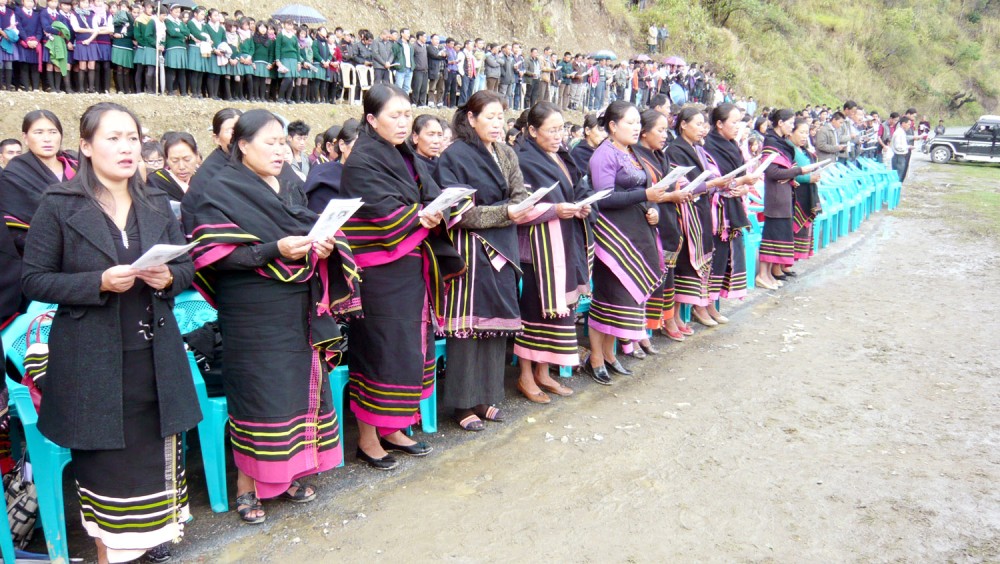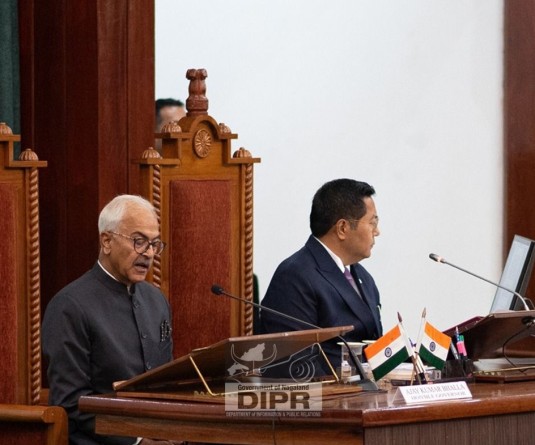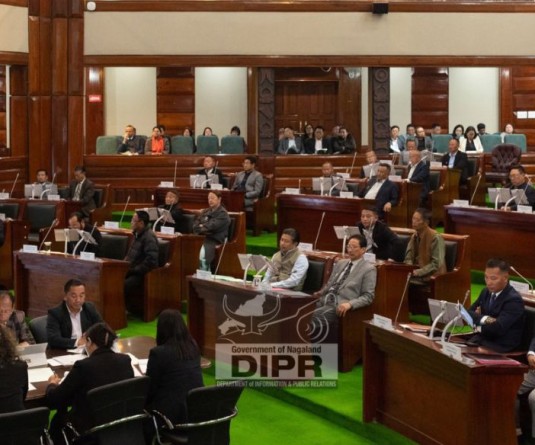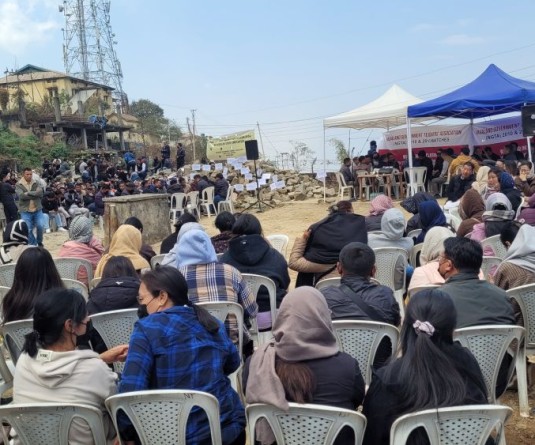Mao women singing a hymn in memory of the two Naga boys who were killed on May 6, 2010 at Mao gate. (Morung Photo)

Neli and Dikho remembered
Morung Express News
Mao Gate | May 6
On May 6, the stretch from Mao Gate and beyond remained silent as a thousand-odd people gathered to pay tribute to Neli Chakho and Dikho Loshuo. For the two minutes of honorary silence (with Vehicles cordoned off on both sides, paying their own tribute), distinct was the buzz of a generator and a few birds. Naga civil society today commemorated the third death anniversary of the two young boys.
Neli and Dikho, one 19 other 20 years of age, lost their lives to firing by Police Commando and IRB of the Government of Manipur on May 6, 2010 at Mao Gate. Three years since, the State’s silence was evident at the third anniversary of the death of the two boys (minor compensations were offered but rejected by the Naga civil society).
At the memorial, the mike kept abuzz. Erstwhile hymn, We Shall Overcome, came first, and a thousand words followed. “It is encouraging to see all Naga leaders here (Mao Gate) to honour the third death anniversary of Neli and Dikho,” spoke Heni Chakho, President of the Mao Council. He was acknowledging the presence of leaders from the Naga Hoho, the Naga Peoples’ Movement for Human Rights (NPMHR), United Naga Council (UNC), All Naga Students’ Association of Manipur (ANSAM), the Committee for Alternative Arrangement, Naga Women’s Union, the Naga Students’ Federation (NSF), and a number of apex tribal bodies and student’s unions.
“Neli and DIkho were killed by anti-Naga forces. We convey heartfelt gratitude to the parents of these brave sons—we cannot repay for their lives but we owe them this tribute for the freedom of our people,” said H.K. Zhimomi, Speaker, Naga Hoho. But the deaths were more than martyrdom. Both were students from Kalinamei Village in Mao district (Manipur) who had worked through their circumstances to attain merit, academic and moral. One studied at St. Joseph’s Bangalore, the other at St. Joseph’s Jakhama. On May 6, 2010, they died protesting the attitude of the Government of Manipur towards the people of the hills in the state—that of neglect and dismissal.
Their third death anniversary was attended by children from surrounding schools, of the schools that Neli and Dikho studied in, of the neighbourhoods they visited, by their teachers, by those who knew them and those who did not. When the tribute wreaths were laid out at the Martyr’s Memorial Park constructed in their memory in 2011, one of their teachers cried away silently. Their parents, also in attendance, remained stern, perhaps deliberately so.
“Although there have been seemingly many developments and changes since that fateful day of May 6, 2010, the material conditions in our collective life remain the same,” stated L. Adani, President of the UNC, providing context, if there is to be one.
The deaths epitomizes, he expressed, the spirit of “struggle and sacrifice” by which to achieve “our aspiration”. On July 1, 2010, the Naga People’s Convention declared the severance of political ties with the Government of Manipur and put forward fresh political demands.
“The same oppression of our rights, the same discrimination, the same manipulations, the same inequality in opportunities, the same opposition to our inherent rights to live with dignity and honour, the same objection to our political aspirations for real political empowerment—they continue unabated and in more inclusive measures although more subtly and camouflaged from within,” Adani encapsulated, giving subtle body to the problems from within and without.
Following solidarity messages and tribute songs to the departed, the organizations present put forward a strong ‘reaffirmation’, using the platform to also “assert rights”: “On this third anniversary,” read Gaidon Kamei, General Secretary to the UNC and on behalf of the attendees, “as we pay respect to the martyred students, and the other victims of police atrocities, we also manifest our unwavering commitment to the world for an immediate alternative arrangement outside the communal Government of Manipur, pending settlement of the Indo-Naga issue.” Somehow, the memory of Neli and Dikho translated into more than just the death of their bodies; into a spirit that embodied an aspiration beyond those boundaries.






